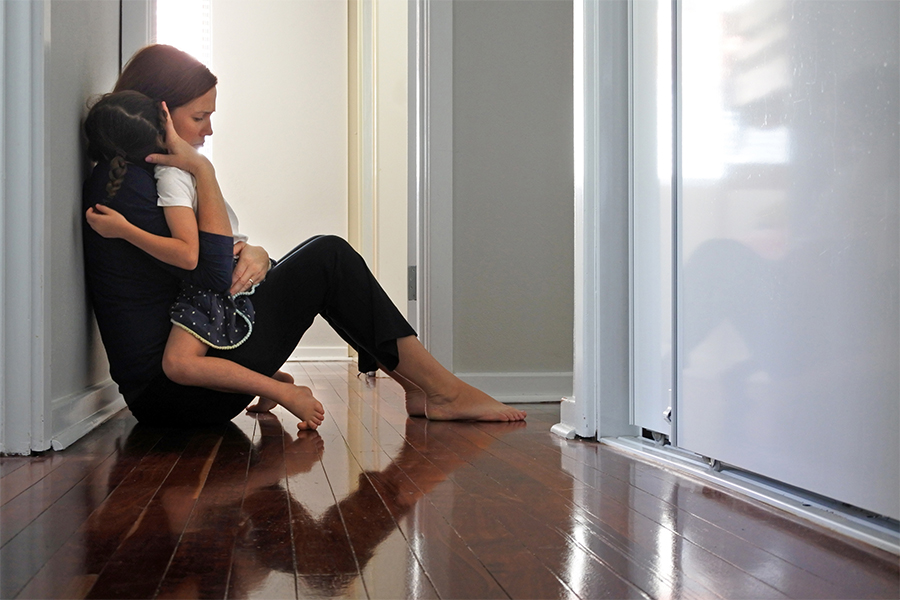When Your Kids Are Struggling with Mental Health, Here’s What to Do

When your kid seems to be feeling down, anxious, or generally not like themselves, it’s natural to want to support them, but sometimes helping them feel better is easier said than done. Emotional challenges are an inevitable part of life, and it can be hard to tell when your child’s struggles warrant a more serious intervention.
“It’s normal for kids to sometimes feel sad or worried and it doesn’t mean there’s a larger problem,” explains Leah Orchinik, PhD, a psychologist at Nemours Children’s Health. But, she says, there doesn’t need to be a larger clinical problem for parents to take action.
Whether your kid is having trouble adjusting to a new situation, struggling socially or experiencing other challenges, there are ways you can help them navigate those emotions and create a healthy, fulfilling routine. Every kid is different, so a parent’s insight into their child’s personality and habits is key for building a treatment plan — and when that insight is combined with the expertise of a doctor, a successful plan can be realized together.
For the patients and families that Dr. Orchinik sees, treatment plans span from identifying the signs and symptoms of mental health challenges in a child, learning to communicate openly and productively, and finding healthy emotional management skills.
“Sometimes, treatment can be brief, and I meet with families once or twice to get to know their child and give the family some strategies,” she says. And from that point, if more care is necessary, Dr. Orchinik can work with a family and give them the tools they’ll need for longer-term treatment. That makes psychologists like her a great resource for any mental health challenges that your children might be dealing with, whether those struggles reach clinical significance or not.
Ultimately, you don’t need to have clinical concerns to bring your child in to see a doctor—there’s always a path forward to help your child handle emotional struggles. Reaching out to a pediatrician or mental health provider when your kid is struggling emotionally is never a bad idea, and providers in the Philly area can partner with your family to help your kids feel their best.

Identifying the Signs Your Child is Struggling
Some children might display signs of emotional struggle more visibly than others—and as a parent, it’s important to have an idea of the more subtle signs to watch out for. According to Dr. Orchinik, it’s also a good idea to recognize potentially triggering situations for your child, so that you can monitor them more closely during those troublesome periods.
Dr. Orchinik says that some common symptoms of mental health challenges in kids are persistent irritability, an increase in hesitance to try new things, significant or recent onset of stress in social settings, physical symptoms like frequent stomachaches, or overreactions to situations that might seem minor. But while these can be signs of anxiety or depression, every kid is different. She encourages parents to watch for behavior that’s different from their child’s norm and to monitor the persistence of symptoms.
“When these symptoms get in the way of things that kids used to want to do, or parents are seeing shifts in previously enjoyed activities—like things not seeming fun, or a kid feeling like they have nothing to look forward to—those are some red flags for mood concerns,” says Dr. Orchinik.
Those red flags might be more likely to show up during certain situations, like seasonal changes and interruptions to routine. With the knowledge you have of your child’s tendencies, you can be proactive in identifying behavioral changes and supporting their well-being during those times.
“If parents know that their child seems to struggle when there’s nothing going on, or when there’s limited daylight during colder, shorter days, it’s good to have a game plan going in to know how to cope,” explains Dr. Orchinik.
That game plan can help your children process their emotions in a healthy way, but it doesn’t mean that having those emotions in the first place is wrong, and it’s important that kids understand that experiencing a range of emotions is healthy.
“If there’s something stressful or different happening in a kid’s life, they’re going to have an emotional reaction to that, and sometimes, it would be more concerning if they didn’t,” she says. Still, there’s a spectrum that ranges from situational discomfort to clinically significant disorders. In making that distinction, it’s important to consider the proportion of a kid’s reaction to the intensity of their situation, and how much of an impact these symptoms are having on their daily function.

Communicating to Understand Your Child’s Experiences
When your child is showing mood changes or a worsened attitude, it might be easy to jump to a solution- or punishment-based response, but according to Dr. Orchinik, this approach might inhibit healing. To communicate with them in a healthy, open forum, you’ll need to make sure your kids feel comfortable opening up—and to do that, it’s important to foster a safe, communicative and comfortable environment for conversations.
“Taking a curious stance, wondering if there is something going on, and being there to listen can be more helpful than trying to fix and problem-solve right away,” Dr. Orchinik says. Plus, she suggests you can take that curious stance even when your kid isn’t displaying concerning signs. When they feel comfortable having emotional conversations in general, it’ll help them feel more comfortable opening up should they ever be struggling.
“We can encourage kids to open up about their worries or things that might be going on at school,” she explains. “And then when there are challenges, you’ve already established a baseline that you can talk about these things.”
When a child is experiencing challenges, there are some tips that can help you navigate your conversations with them. To identify what’s behind their feelings or behavior, Dr. Orchinik recommends checking in on general lifestyle patterns: asking your child if they’re getting enough sleep, eating a balanced diet, and using social media in a healthy way. Though they might seem like surface-level concerns, these factors are the foundation of building a productive plan to boost your kid’s mental health.
To build that plan, Dr. Orchinik recommends a strengths-based approach—and that’s the approach she takes when families bring children into her office. What that approach means is that she’ll learn what aspects of a child’s life are bolstering their well-being and aim to support those aspects. For example, through conversations with a patient and their family, she might learn that a child thrives in social settings and create strategies to integrate more social outings into that child’s regular routine.
“What is working well? How do we support what you are already doing well, and how do we partner collaboratively?” she says.
The inverse to that is identifying what isn’t working for a child’s well-being. When patterns—like a surplus of screen time at night—are fueling negative feelings, parents can talk to their children about them and get on the same page about making healthier habits to feel better.
“Families can say ‘you’re not feeling the way you want to be feeling. This isn’t going well. We need to make some changes,’” suggests Dr. Orchinik.
From this foundation, once you’ve communicated with a child and have a robust understanding of what’s increasing and decreasing their well-being, you can find a path forward that’s best suited to your child’s needs.

Building a Personalized Care Plan
Doing things that are active and enjoyable is a key piece of mental well-being, but that looks different for every child—which is why creating an effective treatment plan means creating a personalized one. For example, one strategy Dr. Orchinik uses in treating depression is a technique called behavioral activation, which means blending healthy, enjoyable activities that support a kid’s interests into their routine. Routine, she says, is healthy for all kids, and behavioral activation serves to maximize the benefits of a routine and boost mood.
“It’s really about having enjoyable activities planned, things to look forward to, and ways to be active,” she says. “That’s going to look different for every kid. It could be playing a sport, playing an instrument, finding time with friends or family, or having game nights. There are lots of ways to build those things into your routine.”
Still, sometimes additional help is needed to help a kid manage their emotions and find joy in their routines.
“If we’re dealing with pretty significant anxiety or depression, therapy is always going to be recommended, and one well-established type is cognitive behavioral therapy (CBT),” says Dr. Orchinik. CBT typically involves making behavior changes through skills like behavioral activation or relaxation strategies, as well as helping identify and change problematic thought patterns so that they can learn to more positively deal with negative emotions. CBT also empowers kids to handle emotional obstacles when they arise in the future.
“CBT helps them challenge those thoughts and get at what’s underlying them, so they can start to talk back to their negative thoughts and shift the way that they’re thinking about things,” she explains.
Plus, because there will always be stresses and worries, this approach teaches kids that they can handle those feelings—and that it’s okay to open up about them and receive whatever treatments and accommodations they need.
“We want to make sure that when we’re supporting kids, we’re not letting their anxiety or social fears control their decisions,” she says. “We need to support the kid and help them be successful in whatever way that may look.”
To learn more about Nemours Children’s Health and make an appointment, click here.
This is a paid partnership between Nemours Children's Health and Philadelphia Magazine

